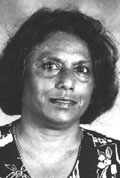SHANTIE
NAIDOO

Shanthie
Naidoo is one of the many South African women who struggled against racism
and apartheid in that country and in exile and is now back home.
Shanthie
Naidoo, at the time a young Johannesburg bookshop assistant, was held
in solitary confinement for six months as a potential witness, and
then a further six months following her refusal to give evidence in the
trial of her comrades, who included Winnie Mandela and Joyce Sikakane;
371 days in total. She was finally released in June 1970.
Shanthie had first been "banned" as a political activist in 1963
for five years. The ban was renewed in 1968. A "banning" order
meant that the banned person could not "gather" with more than
one person, even in the home. She was not supposed to communice at all
with her brother Murthie, who was a "listed" person, although
he was living in the same house. Only in 1972, after winning a long and
arduous battle to obtain an exit permit, was she finally able to leave
South Africa for exile in Britain.
In
her 19 years of exile Shanthie continued to be active in the African
National Congress and worked for the International Defence and Aid
Fund for Southern Africa's research department in London and also at
the Solomon Mahlangu Freedom College in Morogo , Tanzania where she
married Dominic Tweedie. She returned to Johannesburg in 1991, where
she and her husband continue to live and work.
Shanthie's family has a long history of militant resistance in South
Africa and is widely known: the family home was known as the "People's
House". Through more than four generations, Naidoos have
been active in protests and demonstrations against racial discrimination
and then apartheid. Shanthie, her brothers, and her sister Ramnie,
appeared before the Truth and Reconciliation Commission
in 1997 and gave testimony about the treatment they received at the hands of
the National Party government during the 46 years of apartheid.
Shanthie's mother was jailed during the 1946 Passive Resistance by Indians and again in the 1952 Defiance Campaign led by the Congress Alliance. Her brother Indres served a 10 year sentence on Robben Island (1963 to 1973); he published an updated version of his book Island in Chains earlier this year. Her youngest brother, Prema, served a year in the 1980s. Both Indres and Prema were severely tortured. Shanthie is currently researching and writing the family history."